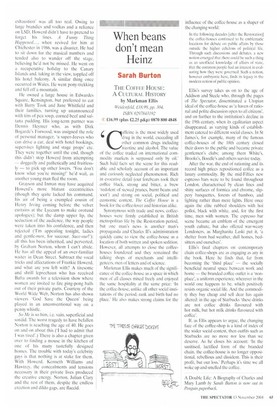When beans don't mean Heinz
Sarah Burton
THE COFFEE HOUSE: A CULTURAL HISTORY
by Markman Ellis Weidetifeld, f18.99, pp. 304, ISBN 0297843192 £16.99 (plus £2.25 p&p) 0870 800 4848
Caffeine is the most widely used drug in the world, exceeding all other common drugs including nicotine and alcohol. The value of the coffee traded on international commodity markets is surpassed only by oil.' Such bald facts set the scene for this readable and scholarly account of an important and curiously neglected phenomenon. Rich in evocative detail (our forebears took their coffee black, strong and bitter, a brew 'redolent of stewed prunes, burnt beans and soot') and strong on social, political and economic context, The Coffee House is a book for the coffee-lover and historian alike.
Synonymous with trade and news, coffeehouses were firmly established in British metropolitan life by the Restoration period, but one man's news is another man's propaganda and Charles Il's administration quickly came to view the coffee-house as a location of both written and spoken sedition. However, all attempts to close the coffeehouses foundered and they remained the talking shops of merchants and intelligel-leers. men of letters and of science.
!Markman Ellis makes much of the significance of the coffee-house as a space in which men of all classes mixed freely and enjoyed the same hospitality at the same price: 'In the coffee-house, unlike all other social institutions of the period, rank and birth had no place.' He also makes strong claims for the influence of the coffee-house as a shaper of the changing world: In the following decades (after the Restoration] the coffee-houses continued to be emblematic locations for debate on public affairs by those outside the higher echelons of political life. Through such discussions and debates, a new notion emerged that there could be such a thing as an unofficial knowledge of affairs of state, that the common people had an interest in evaluating how' they were governed. Such a notion, however embryonic here, finds its legacy in the modern notion of public opinion.
Ellis's survey takes us on to the age of Addison and Steele who, through the pages of The Spectator, disseminated a Utopian ideal of the coffee-house as 'a haven of rational and polite discussion open to all citizens', and on further to the institution's decline in the 19th century, when its egalitarian aspect disappeared, as varying kinds of establishment catered to different social classes. In St James's, for example, many of the famous coffee-houses of the 18th century closed their doors to the public and became private gentlemen's clubs; among them White's, Brooks's, Boodle's and others survive today.
After the war, the end of rationing and its record high prices repositioned coffee as a luxury commodity. By the mid-Fifties new espresso bars were to be found throughout London, characterised by clean lines and shiny surfaces of formica and chrome, slippery banquettes, forests of bamboo, and lighting rather than mere lights. Here once again the elite rubbed shoulders with hoi polloi, black with white, and, for the first time, men with women. The espresso bar scene became an emblem of the emergent youth culture, but also offered war-weary Londoners, as Marghanita Laski put it, 'a shelter front had weather, dull homes, bedsitters and ourselves'.
Ellis's final chapters on contemporary chain coffee-shops are as engaging as any in the book. Here he finds that, far from becoming the 'third place' — the socially beneficial neutral space between work and home — the branded coffee outlet is a 'nonplace', a uniform experience, wherever in the world one happens to he, which positively resists organic social life. And the commodity they buy cheap and sell dear has again altered: in the age of Starbucks 'these drinks are not coffee drinks flavoured with hot milk, but hot milk drinks flavoured with coffee'.
If, as Ellis appears to argue, the changing face of the coffee-shop is a kind of index of the wider social context, then outfits such as Starbucks are no more nor less than we deserve. As he closes his account: 'In the sanitised, lactified form of the branded chain, the coffee-house is no longer oppositional, rebellious and dissident. This is their profit, but our loss.' Perhaps it's time we all woke up and smelled the coffee.
A Double Life: A Biography of Charles and Mary Lamb by Sarah Burton is now out in Penguin paperback.


























































































 Previous page
Previous page